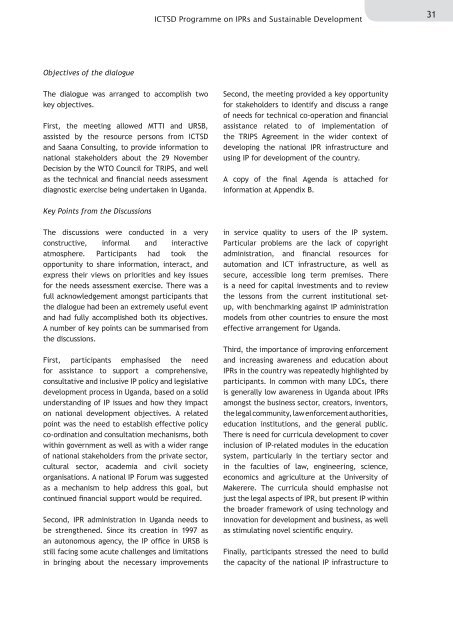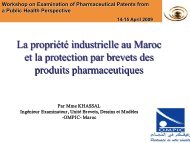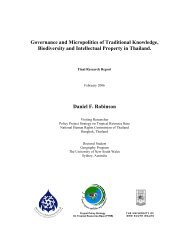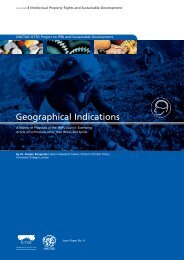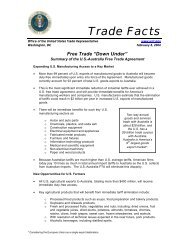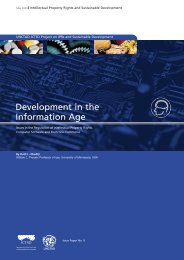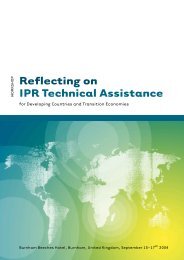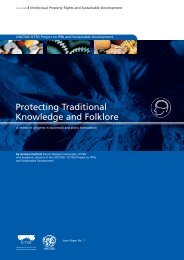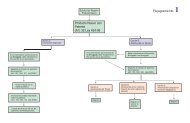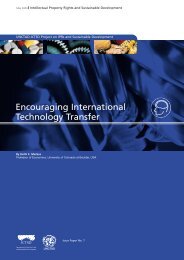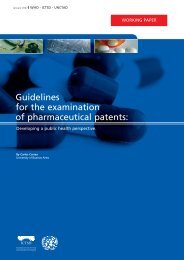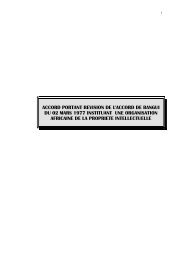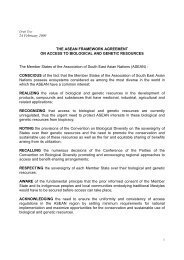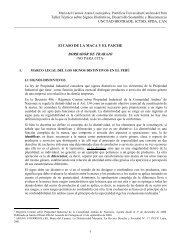Final Report of Uganda Intellectual Property ... - IPRsonline.org
Final Report of Uganda Intellectual Property ... - IPRsonline.org
Final Report of Uganda Intellectual Property ... - IPRsonline.org
Create successful ePaper yourself
Turn your PDF publications into a flip-book with our unique Google optimized e-Paper software.
ICTSD Programme on IPRs and Sustainable Development<br />
31<br />
Objectives <strong>of</strong> the dialogue<br />
The dialogue was arranged to accomplish two<br />
key objectives.<br />
First, the meeting allowed MTTI and URSB,<br />
assisted by the resource persons from ICTSD<br />
and Saana Consulting, to provide information to<br />
national stakeholders about the 29 November<br />
Decision by the WTO Council for TRIPS, and well<br />
as the technical and financial needs assessment<br />
diagnostic exercise being undertaken in <strong>Uganda</strong>.<br />
Second, the meeting provided a key opportunity<br />
for stakeholders to identify and discuss a range<br />
<strong>of</strong> needs for technical co-operation and financial<br />
assistance related to <strong>of</strong> implementation <strong>of</strong><br />
the TRIPS Agreement in the wider context <strong>of</strong><br />
developing the national IPR infrastructure and<br />
using IP for development <strong>of</strong> the country.<br />
A copy <strong>of</strong> the final Agenda is attached for<br />
information at Appendix B.<br />
Key Points from the Discussions<br />
The discussions were conducted in a very<br />
constructive, informal and interactive<br />
atmosphere. Participants had took the<br />
opportunity to share information, interact, and<br />
express their views on priorities and key issues<br />
for the needs assessment exercise. There was a<br />
full acknowledgement amongst participants that<br />
the dialogue had been an extremely useful event<br />
and had fully accomplished both its objectives.<br />
A number <strong>of</strong> key points can be summarised from<br />
the discussions.<br />
First, participants emphasised the need<br />
for assistance to support a comprehensive,<br />
consultative and inclusive IP policy and legislative<br />
development process in <strong>Uganda</strong>, based on a solid<br />
understanding <strong>of</strong> IP issues and how they impact<br />
on national development objectives. A related<br />
point was the need to establish effective policy<br />
co-ordination and consultation mechanisms, both<br />
within government as well as with a wider range<br />
<strong>of</strong> national stakeholders from the private sector,<br />
cultural sector, academia and civil society<br />
<strong>org</strong>anisations. A national IP Forum was suggested<br />
as a mechanism to help address this goal, but<br />
continued financial support would be required.<br />
Second, IPR administration in <strong>Uganda</strong> needs to<br />
be strengthened. Since its creation in 1997 as<br />
an autonomous agency, the IP <strong>of</strong>fice in URSB is<br />
still facing some acute challenges and limitations<br />
in bringing about the necessary improvements<br />
in service quality to users <strong>of</strong> the IP system.<br />
Particular problems are the lack <strong>of</strong> copyright<br />
administration, and financial resources for<br />
automation and ICT infrastructure, as well as<br />
secure, accessible long term premises. There<br />
is a need for capital investments and to review<br />
the lessons from the current institutional setup,<br />
with benchmarking against IP administration<br />
models from other countries to ensure the most<br />
effective arrangement for <strong>Uganda</strong>.<br />
Third, the importance <strong>of</strong> improving enforcement<br />
and increasing awareness and education about<br />
IPRs in the country was repeatedly highlighted by<br />
participants. In common with many LDCs, there<br />
is generally low awareness in <strong>Uganda</strong> about IPRs<br />
amongst the business sector, creators, inventors,<br />
the legal community, law enforcement authorities,<br />
education institutions, and the general public.<br />
There is need for curricula development to cover<br />
inclusion <strong>of</strong> IP-related modules in the education<br />
system, particularly in the tertiary sector and<br />
in the faculties <strong>of</strong> law, engineering, science,<br />
economics and agriculture at the University <strong>of</strong><br />
Makerere. The curricula should emphasise not<br />
just the legal aspects <strong>of</strong> IPR, but present IP within<br />
the broader framework <strong>of</strong> using technology and<br />
innovation for development and business, as well<br />
as stimulating novel scientific enquiry.<br />
<strong>Final</strong>ly, participants stressed the need to build<br />
the capacity <strong>of</strong> the national IP infrastructure to


